The shop is now open. Featuring specially made garments and accessories.
As part of the opening we are introducing a collaborative series with Champion USA featuring one of our favorite films by Jean-Luc Godard. Each piece is numbered and extremely limited, created specifically for the launch.
"hermes" tee
"cinema" baseball tee
"FIN" crewneck sweater
A Short essay on why we love Weekend courtesy of Thesis Anxiety
Weekend (Week-end, in French), Jean-Luc Godard’s fragmented, brutal farce mocking the values of the French bourgeoisie unfolds through a series of intentionally disjointed set pieces. Throughout Weekend, Godard uses of intertitles (title cards that appear mid-film), and they enliven the film in a number of ways. More then simple chapter headings, Weekend’s intertitles add structure, and while some toy with its temporality. Many title serve as typographic voice, editorializing through coded, clever cultural references, enhancing the film’s bitter irony.
“A purely political film is difficult to do,” Godard wrote in Cahiers du Cinéma in 1965. “For politics you need insights into the points of view of four or five different people, and at the same time have a broad overall-grasp.” But two years later, Godard tackled politics not once, but twice in one year: La Chinoise, a film about France’s fervent political youth, “the children of Marx and Coca-Cola,” premiered in August 1967, and Weekend began production the same month, and was released in December 1967.
Weekend begins abruptly, without revealing its title immediately. Instead, the film proclaims itself “lost in the cosmos.”

Un Film Egaré Dans Le Cosmos
The plot, such as it is, centers on a chic, self-involved, Parisian couple, Corinne and Roland Durand (Mireille Darc and Jean Yanne), and their trip to Corinne’s family’s country home to secure her inheritance on the eve of her mother’s death. Conservations prior to the trip expose the characters’ chillingly immoral natures, as we overhear in the few minutes of the dialogue between Corinne and her lover: “Wouldn’t it be great when Roland drives your father home if both of them died in an accident?” [2] The lover then hands Corinne a drink, and the scene is interrupted by another title:
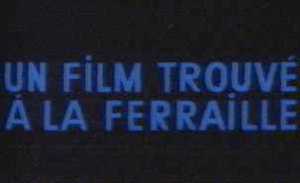
Un Film Trouvé à la Ferraille
A scrap heap of social morality, one supposes. It not the first time Godard has paralleled sexual infidelity and the emptiness of bourgeois values with social and political immorality. The conversation between Corinne and her lover continues, and Corinne reveals that she discouraged her husband from fixing the brakes on his car, hoping he’ll have a accident. As the sinister plans are revealed, so is the title:

Week End Week End Week End
Meanwhile, Roland, the husband, whispers on a telephone to his lover that he also plans to kill Corinne as soon as she is able to secure her inheritance. In an interview with France Catholique just before the shooting of Weekend began in the fall of 1967, Godard revealed his intention to give his modern characters their comeuppance: “Having left in a new car, our heroes will come home on foot…” [3]
The couple departs Paris at 10am (a red title announces “SATURDAY 10AM), and after a hilarious skirmish in the parking lot outside their apartment, the journey to the country begins (SATURDAY 11AM), Weekend’s most famous scene, “one of the the greatest conceptual gags in the history of cinema,” is the traffic jam that the husband and wide encounter leaving Paris. The sequence, marked by a cacophony of honking horns and cursing, lasts for nine minutes and is a series of the long tracking shots cut together with intertitles to create the illusion of one endless shot. Godard superimposes times “SATURDAY 1:40PM”, then word “WEEKEND” followed by “SATURDAY 2:10PM” to suggest that traffic jam continued over an hour, even though he makes no attempt to show the passing of time through cuts, dialogue, or other direction choices.
Intertitles also provide a poetic and musical pulse to the film, introducing different systems of communication one cannot help but compare to The Situationist International and The Letterist International, Dada-inspired avant-garde movements of the 1940s and 50s. Author David Sterritt points out that Godard’s films “share the Lettrist mixture of deadpan whimsy and dead-serious outrage, and his characters have a frequent habit of spray-painting their slogans onto the scrubbed façades of polite society, a practice Situationists themselves honed into a fine art during the late 1960s.”
By playing with the animated of the title card, illuminating some letters before others, Godard creates subliminal wordplay reminiscent of commercial signs and pop art. Weekend’s intertitles contain a lot of words within words. A earlier scene in which Corinne describes—explicitly and at great length—a sexual fantasy (or actual encounter, we aren’t sure) to her lover, is interrupted by the title:

Anal / Analyse
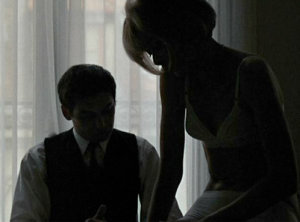
Corinne describes her sexual encounter
The word “analysis” is written on two lines, and Godard rests on “ANAL” before revealing “LYSE.” The “ANAL/YSE” title signifies Freudian theory on two levels—the early stages of sexual development and the concept of psychiatric analysis.
After escaping the traffic jam, the couple arrives in a country village where they immediately witness another accident between a Triumph sports car and a tractor. The handsome driver of the Triumph is killed, and his girlfriend is left to argue with the farmer driving the tractor. A title comes up:
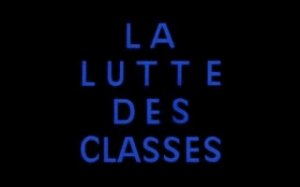
La Lutte des Classes
The SS is not instantly understood as the young girl and the older farmer hurl ignorant but hilarious expletives at each other: “It makes you sick that we’ve got money and you haven’t. . . . I bet you don’t even own [your tractor] and it belongs to one of those rotten unions or some fucking cooperative. . . .” The farmer holds his ground, “If it weren’t for me and my tractor, the French would have nothing to eat.” Soon, the fighting pair ask Corinne and Roland for their opinion, as witnesses. Being disengaged and entirely self-absorbed, Roland declines and drives away. The outraged farmer yells: “Wait you can’t just leave like that, aren’t we all brothers, like Marx said? Bastards! Bastards!” He is joined in his outrage by the girl, who ups the ante, adding: “Jews! Filthy rotten stinking Jews!” [5] chasing the car as it speeds away. The farmer and the girl, then aligned in their anti-semitism, walk away arm-in-arm. The girl poses with the men in town in a series of photos…

Class Struggle
and the another double-entendre title pops up:

Fauxtographe
The “FAUX/TO/GRAPH” title contradicts the words of the character Bruno Forestier in Le Petit Soldat: “If the photo is the truth, cinema is truth twenty-four times per second.” As interruptive elements in an already disjointed film, the titles are not just meant to be comic, they intentionally confuse temporal issues. Intertitles also shatter any illusion of realism the audience may hold when watching a film, a constant reminder that the film is theatrical—a constructed work of art.
Formally, Weekend’s intertitles are all either red or blue capital letters (a few are red, white and blue) set against a black background. The red titles are reserved for hours, days of the week, and months—all obsessively titled throughout the film. Notions of time, in Weekend, are indicated precisely at the beginning of the film, but as the characters lose themselves on their endless, carless journey back to Paris, time becomes increasingly abstract. Godard cleverly charts the anarchic disintegration of the plot by switching time from the familiar Gregorian to obscure French Revolutionary calendar, indicating the passage of time with disorienting and unfamiliar months names “Pluviôse,” “Thermidor,” and finally,“Vendémiaire”
(the month when France was proclaimed a Republic). [6]
Despite its apocalyptic vision, Weekend is crammed with almost obsessive cultural references and insider jokes reminiscent of earlier New Wave films. Through intertitles, Godard cites literature, cinema, and popular culture, creating witty semiotic puns [9]:

De La Révolution Française Aux Weekends UNR
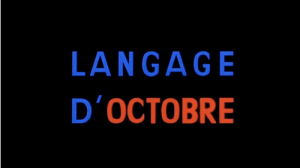
Langage D'Octobre
Author Richard John Neupert points out that “Weekend’s intertitles force a wedge between time of viewing and time of understanding. Some titles may only be understood after the screening, or even during subsequent research and a second and third viewing of the film.”10 Godard’s references to the Gaullist party, Marcel Proust/Lewis Carroll, Bertold Brecht/Brigitte Bardot, Robinson Crusoe/Friday, Honoré de Balzac, Sergei Eisenstein function like early hyperlinks, creating non-linearity and discontinuity. Ironically, as the film draws to a close, Godard interrupts a highly linear scene with a conventional narrative with a title that literally read “DISCONTINUITY”:
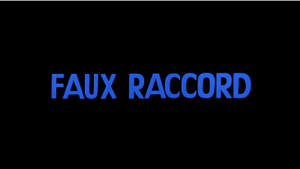
Faux Raccord
In Weekend, Godard successfully caricatures a dystopian, materialistic world, perverted by viciousness, infusing the story with disruptive intertitles, creating multi-layered political conversation between the filmmaker and his audience. The final title, “End of Story/End of Cinema,” (Fin du Conte/Fin du Cinema), Godard makes this bold and prescient claim as the sixties were coming to a close—clearing marking his break with the establishment, and ironically, the end of his critical and popular success.
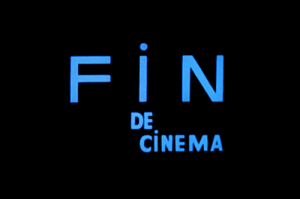
End of Cinema
Notes:
- Jean Luc Godard, Jean Narboni, Tom Milne, Godard on Godard (Da Capo Press, 1986), 225
- Weekend: A Film by Jean-Luc Godard (Lorrimer Publishing, Ltd, 1972), 18
- France Catholique, August 25, 1967
- David Sterritt, The Films of Jean-Luc Godard: Seeing the Invisible(Cambridge University Press, 1999), 92
- Weekend: A Film by Jean-Luc Godard (Lorrimer Publishing, Ltd, 1972), 41
- Dating system adopted in 1793 during the French Revolution. It sought to replace the Gregorian calendar with a scientific and rational system that avoided Christian associations. The year began with the autumnal equinox and the day on which the National Convention had proclaimed France a republic, 1 Vendémiaire, Year I (Sept. 22, 1792). The other autumn months were named Brumaire and Frimaire; they were followed by the winter months Nivôse, Pluviôse, and Ventôse, the spring months Germinal, Floréal, and Prairial, and the summer months Messidor, Thermidor, andFructidor. On Jan. 1, 1806, the Gregorian calendar was reestablished by the Napoleonic regime.
- The Gaullist Party at the time: Union for the New Republic (Union pour la Nouvelle République)
- “Scenes de la vie de province” and “Scenes de la vie Parisian” are sections in La Comédie Humaine by Honoré de Balzac.
- October, a film by Sergei Eisenstein, was one of two films commissioned by the Soviet government to honor the tenth anniversary of the 1917 October Revolution
- Richard John Neupert, The End: Narration and Closure in the Cinema(Wayne State University Press, 1995), 162







No comments:
Post a Comment